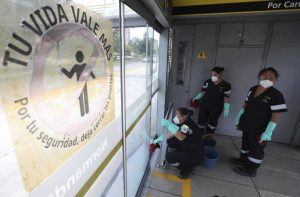…Guyana among countries that introduced stringent measures to slow spread
AS the novel coronavirus (COVID-19) continues to spread, several countries around the world have taken stringent measures to reduce the rate and likeliness of infection.
Here in Guyana, where only five cases and one death have been confirmed, the Ministry of Health has set up a toll-free number for persons experiencing symptoms of the disease; several quarantine facilities for persons infected, and persons who came into contact with someone infected are being placed on mandatory quarantine.

Meanwhile, many businesses and offices in the private and public sector have either closed completely or introduced greater measures to practice the World Health Organisation (WHO) recommended ‘social distancing’. Guyana has also banned international flights for two weeks beginning March 18, 2020; closed schools for two weeks since March 16, 2020; temporarily banned permits for social gathering events; launched an education campaign into handwashing and COVID-19 preventative measures, and introduced a shift system for public servants amongst other efforts.
In the nearby Caribbean where cases have also been confirmed, Jamaica is being hailed for its stand-out and efficient response to the virus. Their government has implemented laws which restrict movement and which took effect on March 18, 2020, and all travellers from countries where there is local transmission of COVID-19 will be required to self-quarantine for 14 days.
Added to this, all non-essential work is required to be done from home; hospital visits have been reduced to once per day; there must be no gathering of over 20 persons at one place whether funeral or entertainment events; public transport (JUTC busses) must carry only seated passengers and taxis one fewer passenger than the licensed limit. The country has also invested millions in the fight against the spread of the disease and fines not exceeding $1,000,000 or imprisonment up to 12 months can come to those who disregard these and other measures in place.
The country has recorded 16 cases of the virus, thereby leading the Caribbean where there are over 45 cases including three deaths. All the way over in the United Kingdom (UK) – made up of Scotland, England, Wales and Northern Ireland – there were over 3,000 positive cases and over 140 deaths as of March 20, 2020.
British Prime Minister, Boris Johnson, has closed all pubs, bars, restaurants and cafes and the government there has also pledged to pay 80 per cent of wages for those unable to work and has introduced a package of measures to protect the income of workers who may lose their jobs. While other measures implemented are similar to most countries, some others stand out.

Just recently, the Church of England limited weddings to just five people where, a part from the couples themselves, everyone should observe social distancing while the priests have cut out the tradition of touching the rings or the couple’s hands.
In neighbouring Brazil where there are over 600 cases, the country’s government announced on Thursday that it would bar citizens from certain countries but would leave its ports open to the United States. As Brazil continues to record additional cases of the virus, its government gazetted an order to close its border with several countries including Guyana on Thursday.
Meanwhile, the Washington Post said on Friday that Venezuela’s “broken healthcare system is uniquely vulnerable to coronavirus,” as the country was recently denied a requested five billion from the IMF to fight the disease. Its leader, Nicholas Maduro, has ordered all citizens to wear face masks in public; military branches and the national police have been deployed to enforce quarantine measures and WHO has agreed to provide tests and other medical supplies.
Suriname’s ports and borders have been closed since its first imported case.
In Saudi Arabia, the Kingdom announced a total of 270 cases as of Friday and has since shut down its mosques for the customary five daily prayers. The United Arab Emirates has suspended its visa on arrival scheme and up to five years jail time await those who disregard an implemented 14-day quarantine time frame.
The Guardian reported on Friday that over on the continent of Africa, Governments across countries were rushing to reinforce measures to contain or prevent the spread. However, as of Monday, only 27 countries there had recorded cases of COVID-19, amounting to 347.
Sudan has shut off all its sea ports, land crossings and airports; Egypt has suspended flights from all its airports facing over 126 cases; South Africa has declared a ‘national state of disaster’; Kenya and Ghana have imposed a travel ban on foreigners from all countries with reported cases and Ethiopia, Senegal and Kenya have announced school closures.
As of March 20, 2020, there have been 709 confirmed cases of COVID-19 in Australia and six persons have died. Australia has applied travel restrictions to reduce visitors from high-risk countries; implemented a $17.6B economic support package to encourage investment and keep people in jobs and more.



.jpg)










